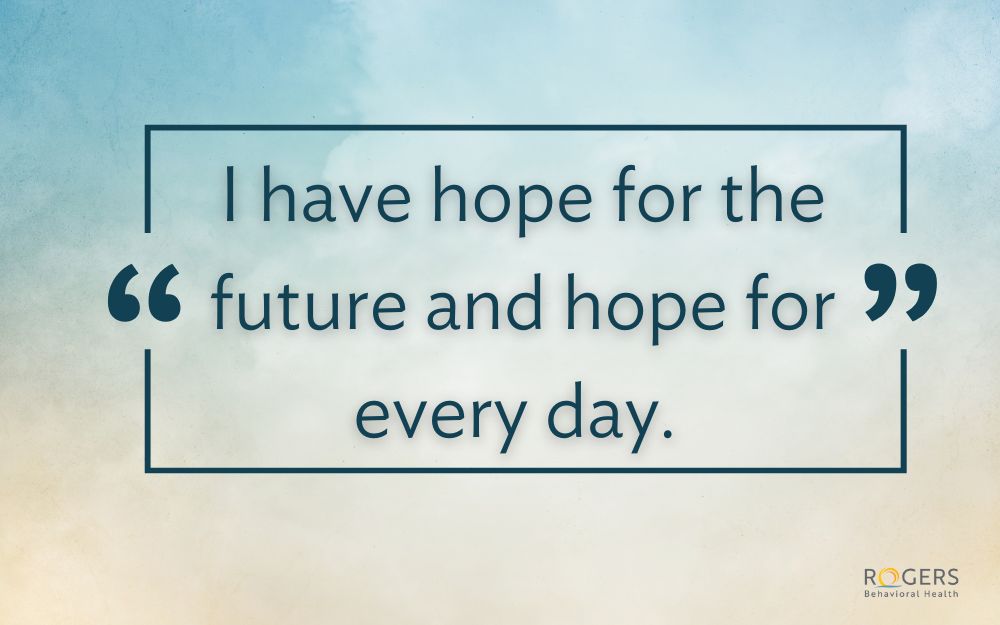Successful New Year’s resolutions: Strategies for setting goals
Posted on 01/09/25 01:43:pm
Share this article:
By Heather Jones, PhD, vice president of clinical services at Rogers Behavioral Health
The start of a new year is a natural time to want to reflect and reset. While New Year’s resolutions often symbolize hope and a fresh start, they can also bring additional pressure and stress if not approached thoughtfully. Rogers Behavioral Health’s Dr. Heather Jones explains how to set realistic goals while giving yourself grace.
Is setting “intentions” rather than resolutions a healthier approach?
Both goals and intentions can be beneficial for personal growth. The best approach often depends on the person and the specific situation. Some people may find that setting specific, measurable goals helps them stay motivated and focused. Others may prefer a more flexible approach that allows for spontaneous and creative responses. Ultimately, the most important thing is for each person to choose a method that works best for them and helps them achieve their desired outcomes.
There are key differences between the two:
Goals are:
- Specific and measurable: Goals are typically concrete and quantifiable, such as, "I want to lose 10 pounds" or "I’m going to run a marathon."
- Outcome focused: Goals are oriented towards achieving a specific outcome or result.
- Time-bound: Goals often have a specific deadline or timeframe.
Intentions are:
- Broad and flexible: Intentions are more general and open-ended, such as, “I want to be more mindful" or "I’m going to practice self-compassion."
- Process focused: Intentions emphasize the process of doing something rather than a specific outcome.
- Timeless: Intentions can be ongoing and don't necessarily have a specific deadline.
The most effective way to achieve goals is to ensure they are SMART: Specific, Measurable, Appealing, Realistic, and Time-bound. Another strategy I’ve found helpful in achieving goals, whether around New Year’s or otherwise, is to align them with my personal values so that I’m doing things I enjoy.
Why do people struggle to maintain their resolutions?
There are several reasons why people have difficulty maintaining their resolutions.
- Lack of realistic goal setting: Many people set overly ambitious goals that are difficult to sustain.
- Depletion of willpower: Willpower is a limited resource, and relying solely on it to maintain a new behavior can be challenging.
- Immediate gratification: Our brains are wired for immediate rewards, which can make it difficult to prioritize long-term goals.
- Fear of failure: It can lead to procrastination and avoidance, making it harder to stick to resolutions.
- Lack of support: Having a strong support system or accountability partner can significantly increase the likelihood of success.
How can people practice being kind to themselves if they fall short?
While there isn't a specific, widely cited statistic on the exact percentage of people who fail to achieve their New Year's resolutions, various studies and surveys have consistently shown that a significant majority struggle to maintain them. In his book Atomic Habits, James Clear’s core idea is that by improving by just 1% each day, we can achieve significant results over time.
New Year’s resolutions can trigger feelings of guilt and failure. My recommendation is to, again, set realistic goals and give grace while we’re working to make 1% changes over time. Maybe on some days we make a 5% change and on other days it’s harder for us to see the positive change in our lives.
Additionally:
- Rethink the target to be shaping behavior over time and looking for opportunities to continuously improve and problem solve when we don’t reach our expected goal, rather than slipping into self-blame or self-deprecation.
- Celebrate the wins and steps taken toward achieving the goal!
- Embrace the setbacks as opportunities to learn. "The only real mistake is the one from which we learn nothing." This quote, often attributed to John Powell, highlights the idea that mistakes are only truly detrimental if we don't learn from them and grow from the experience.
- Reframe “failure” and start over.
Try not to make impulsive resolutions. Remember that personal change and well-being are a marathon and not a sprint.
To hear more from Dr. Jones about achieving goals in our Rise Above podcast, click here.
Rogers offers mental health and addiction care
At Rogers, you or your loved one will receive care tailored to your needs wherever you are on your journey to a brighter future. You aren’t defined by your challenges. When you’re ready to hear how we can help give us a call at 800-767-4411 for a free, confidential screening.


